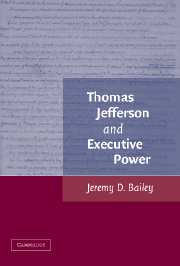Book contents
- Frontmatter
- Contents
- List of Figures and Table
- Preface
- Acknowledgments
- Abbreviations
- 1 “The execution of laws is more important than the making of them”: Reconciling Executive Power with Democracy
- 2 Executive Power and the Virginia Executive
- 3 Executive Power and the Constitution of 1787
- 4 “To place before mankind the common sense of the subject”: Declarations of Principle
- 5 The Real Revolution of 1800: Jefferson's Transformation of the Inaugural Address
- 6 To “produce a union of the powers of the whole”: Jefferson's Transformation of the Appointment and Removal Powers
- 7 The Louisiana Purchase
- 8 To “complete their entire union of opinion”: The Twelfth Amendment as Amendment to End All Amendments
- 9 “To bring their wills to a point of union and effect”: Declarations and Presidential Speech
- Development and Difficulties
- Index
8 - To “complete their entire union of opinion”: The Twelfth Amendment as Amendment to End All Amendments
Published online by Cambridge University Press: 24 July 2009
- Frontmatter
- Contents
- List of Figures and Table
- Preface
- Acknowledgments
- Abbreviations
- 1 “The execution of laws is more important than the making of them”: Reconciling Executive Power with Democracy
- 2 Executive Power and the Virginia Executive
- 3 Executive Power and the Constitution of 1787
- 4 “To place before mankind the common sense of the subject”: Declarations of Principle
- 5 The Real Revolution of 1800: Jefferson's Transformation of the Inaugural Address
- 6 To “produce a union of the powers of the whole”: Jefferson's Transformation of the Appointment and Removal Powers
- 7 The Louisiana Purchase
- 8 To “complete their entire union of opinion”: The Twelfth Amendment as Amendment to End All Amendments
- 9 “To bring their wills to a point of union and effect”: Declarations and Presidential Speech
- Development and Difficulties
- Index
Summary
Congressional debates recorded in The Annals of Congress suggest another reason why Jefferson did not recommend a constitutional amendment for purchasing and incorporating Louisiana. When Congress convened in October 1803, Republicans already knew they had to propose another constitutional amendment fixing the Electoral College. By inserting the “discriminating principle” into the Electoral College, Republicans could be assured that the Federalists would not be left open the chance in 1804 to make another Aaron Burr president or, alternatively, a Federalist vice president. By lessening the possibility of an election in the House, Republicans could make it more likely that Jefferson's victory in 1804, unlike that in 1800, would be unambiguous. Jefferson's silence on Louisiana was thus required by a second political necessity. Had he recommended a constitutional amendment, he would have risked delaying the ratification of the Twelfth Amendment's “discriminating principle,” gambling on the significance of his own reelection in 1804 and his party's chances in 1808.
When members of Congress arrived in October, 1803, for the first session of the Eighth Congress, Republicans wasted little time in proposing the amendment for designation. On 17 October, John Dawson (R-VA) introduced the amendment in the House, as did De Witt Clinton (R-NY) in the Senate on 21 October. But, again, the clear arithmetic of Republican electoral strategy and Republican power in Congress offered no guarantee of a constitutional amendment, for as Jefferson and his party would learn, the Constitution's cumbersome procedure for amendment made constitutional change difficult, even for a president whose party was in the majority.
- Type
- Chapter
- Information
- Thomas Jefferson and Executive Power , pp. 195 - 224Publisher: Cambridge University PressPrint publication year: 2007



